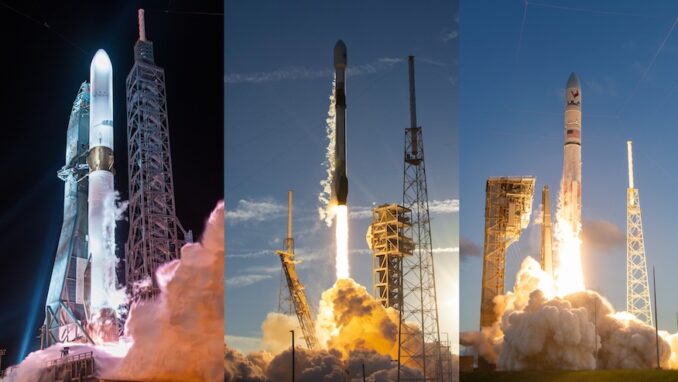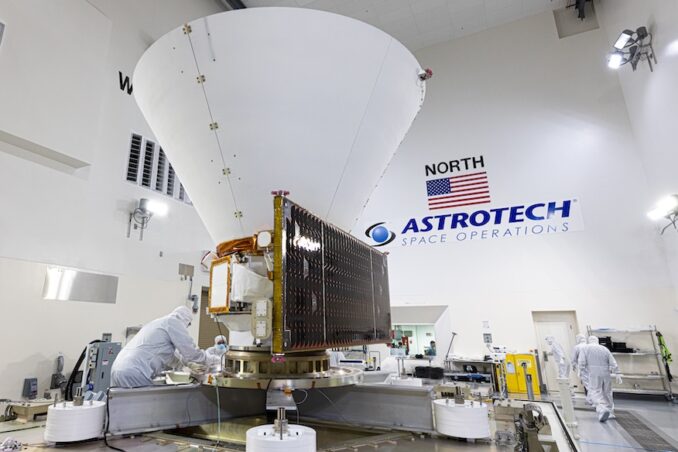
Getting newer and increasingly more capable assets in space for U.S. service members and allies is a primary goal for the U.S. Space Force. Among the challenges to bolstering America’s various on orbit capabilities though is having space on Earth to get them ready for launch.
To help with processing spacecraft in Florida, the U.S. Space Force’s (USSF) Space Systems Command (SSC) tapped Blue Origin to construct a new payload processing facility (PPF) at Cape Canaveral Space Force Station. Initial Operational Capability (IOC) is scheduled for “early calendar year 2028,” according to an SSC Assured Access to Space (AATS) spokesperson.
The National Security Space Launch (NSSL) Space Vehicle (SV) Processing Commercial Solutions Opening (CSO) contract is valued at $78.25 million with the facility set to be located on CCSFS property as opposed to Blue Origin’s campus at Rocket Park, adjacent to the Kennedy Space Center Visitor Complex.
“This second CSO award reflects our continued commitment to meet both national security and commercial launch requirements,” said USSF Col. Dan Highlander, Director of Operations Integration for SSC’s Assured Access to Space directorate in a statement.

This is the second such contract awarded, following a $77.5 million agreement with Astrotech announced in April that will expand its footprint at Vandenberg Space Force Base in California. An AATS spokesperson said the CSO contracting process was closed on Sept. 30.
“Future requirements for additional payload processing capabilities will be addressed as part of USSF’s budget when Congressional appropriations are enacted for Fiscal Year 2026,” the spokesperson said in a statement to Spaceflight Now.
The CSO contract received a total of 12 proposals for capabilities at both the Eastern and Western Ranges. Five of those were for specifically Eastern Range needs.
Blue Origin’s new facility will include space for “several pre-launch preparatory activities” that include charging batteries; fueling satellites; loading other gaseous and fluid commodities; and encapsulation. To accomplish those tasks, Blue Origin will create “a clean, secure, specialized high-bay facility capable of handling flight hardware, toxic fuels, and explosive materials.”
The AATS spokesperson said the new Blue Origin payload processing facility is “designed to accommodate up to 16 missions per year.” Among those, they said the Space Force anticipates capacity for an additional seven or eight NSSL missions.
“This additional capacity will ensure the USSF is able to continue to deliver responsive and resilient launch capabilities to the warfighter, and the public-private partnership behind the new capacity enables us to cost-share with commercial industry to our mutual benefit,” Highlander said.
New space, new partnerships
While Blue Origin is the company that will spearhead the creation of this new PPF, it won’t bar other launch providers from using the space.
An AATS spokesperson said the facility would accommodate all NSSL payloads across the various launch providers at the Cape, which currently include Blue Origin, SpaceX and United Launch Alliance. The latter two were each recently chosen to fly mission for the second order year of the NSSL Phase 3 Lane 2 contract.
In March, SSC onboarded both Rocket Lab and Stoke Space for the NSSL Phase 3 Lane 1 contract, which allows companies to bid for missions annually that have less stringent launch requirements. Blue Origin, SpaceX and ULA are also part of this contract with SpaceX winning the first two Launch Service Task Orders (LSTOs), valued at $733.6 million, in October 2024.
Stoke aims to launch its first Nova rocket from Launch Complex 14 at the Cape beginning in 2026. Rocket Lab aims to launch its first Neutron rocket from the Mid-Atlantic Regional Spaceport on Wallops Island in Virginia before the end of the year and currently has no plans to launch from Florida.
“We are proud to work with the U.S. Space Force Space Systems Command to construct a new Payload Processing Facility supporting multiple launch vehicle providers on Florida’s Space Coast,” a Blue Origin spokesperson said in a statement. “This partnership will enhance Blue Origin’s capabilities to operate more efficiently and expand our capacity to support a higher launch cadence to meet customer needs.”
An AATS spokesperson said that the USSF anticipates the interagency agreements that it has with the National Reconnaissance Office and NASA for coordination on use of their PPFs will be extended to the one being built by Blue Origin.
“Blue Origin will be able to schedule and utilize the facility for their commercial customers as well, including potential Government use of commercial capabilities,” that spokesperson said as well.
source: spaceflightnow.com